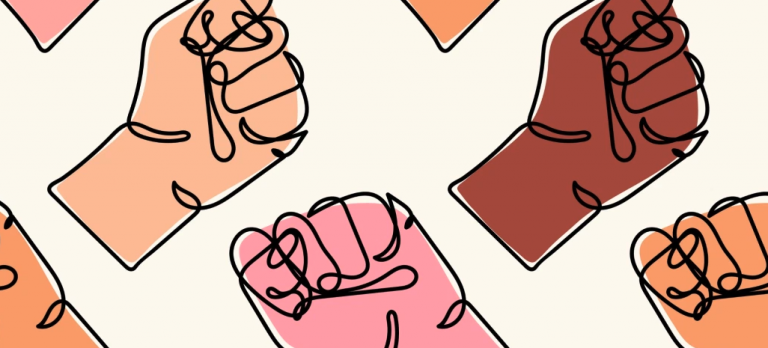When I discovered yoga in my early 20s, yoga ads—and many of the classes I attended— were filled with more blonde-haired, blue-eyed yogis. Once again, I felt isolated in my “otherness.” As I developed awareness of my own self-loathing through the mindful practices, I told myself that yoga—this thing that I loved so much and made my heart feel so open—must only carry good things with it—right?
Unfortunately, that’s not the case. Racism toward individuals of Asian descent happens even within the yoga community. Violent events like the tragedy in Georgia make headline news, but Asian Americans face daily micro-aggressions in wellness spaces that we must choose to ignore or “let slide.” It is an all-too-common Asian American experience to be asked, “Where are you from? No, I mean where are you REALLY FROM?” Often this line of questioning is followed by, “Wow, your English is so good.” Being labeled as the perpetual foreigner, our otherness is further thrown in our faces like the expectation that we be quiet and unobtrusive—that “model minority.”
As an Asian American woman who owned a yoga center in the South, I was often told, “When I saw there was an Ingrid on the schedule teaching this class, I didn’t expect to see someone who looks like YOU.”
On my yoga-specific social media, I would get comments about my “Asian beauty” or exoticism. This objectification happened so many times, that I changed my content to avoid showing a bare belly or any hint of cleavage. Rather than risk being exoticized, I decided I’d rather not be seen at all. I chose hiding away over being objectified in a manner informed by predatory sexual behaviors and the subjugation of women from different cultural backgrounds.
Non-harming means acknowledging
In 2015, I taught a class shortly after the Charleston Church Massacre, in which a white supremacist murdered nine worshippers at the Emanuel African Methodist Church. As usual, I started the class by setting an intention. “We don’t want to talk about it, but we have to,” I told my students. I asked them to open their hearts to victims of the shooting. “We can’t ignore and pretend it’s not happening.”
After class, one of my long-time students embraced me and thanked me with tear-filled eyes for the beautiful message and intention. But later that night, I got a text from the studio owner: “Ingrid, someone complained that you brought up a political issue in class today and they said they go to yoga to escape, not think about shootings. Please reconsider the topics you bring up in class.”
As yogis we tell ourselves that we are about peace and ahimsa. But non-harming means acknowledging and talking about the elephant in the room: that racism exists within yoga communities. It affects all of us. Racial hatred is everyone’s pain, not just the pain of the Atlanta shooting victims, or of people of Asian or African descent. Racially driven hate diminishes the dignity of every community whether it be Black, Asian, Latino, Middle Eastern, white or any other.
How do we fix this? First, we acknowledge its existence. Then, we have to be open to the conversations – the hard, vulnerable, scary conversations. We also need to reconsider our own subconscious biases and the ways in which we perpetuate others’ pain and are unwilling to uncover our own vulnerabilities. These places are raw, embarrassing, and often guilt-ridden. But they are where transformation happens.
It is only when we become more conscious of our own intrinsic biases that we can become aware of how to support others through their own traumas, even when we think they do not affect us.
Let’s raise our consciousness together
My experiences are not every Asian American’s experience. They are not every Asian American female’s experience, nor every Asian American yogi’s experience. In writing this, I do not speak on behalf of others, but I publicly declare that I will choose to speak up on behalf of others. And I ask you to do the same. Be willing to have hard conversations that feel uncomfortable. Read more about the history of other cultures. Stand up and say it is not OK to hurt others, whether through words or actions. Speak out when you see racially motivated injustice happening in front of you. Speak out, loudly.
I believe in our community of yogis. I believe we are better than this. We have the ability to use our non-harming values to support those who need to be bolstered and defend those that would otherwise be victims. We can come to our communities with the same vulnerability we bring to our mats. Let’s raise our consciousness together—as yogis and as humans—by keeping our hearts open and our minds awake. This is our moment.
Ingrid Yang is an internal medicine physician, yoga therapist, and published author. She has been teaching yoga for over 20 years and is the author of the books Adaptive Yoga and Hatha Yoga Asanas. Dr. Yang leads trainings and retreats all over the world, with a special focus on kinesthetic physiology and healing through breathwork, meditation and mind-body connection. Find out more at www.ingridyang.com or instagram.com/ingridyangyogamd.

